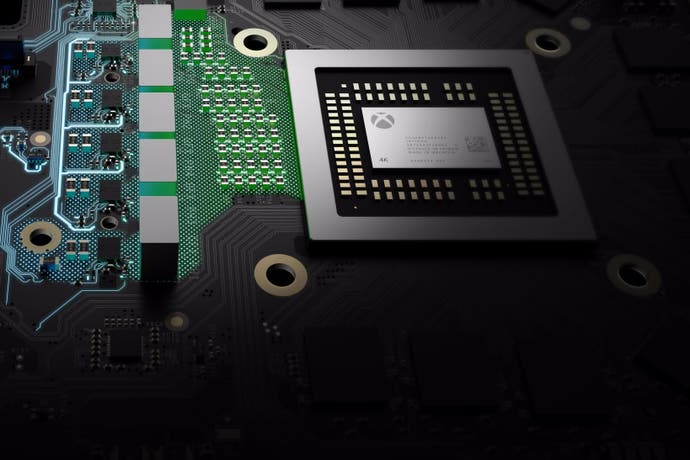Why Microsoft is making Project Scorpio
"Win the developers back."
With today's reveal of the tech behind Project Scorpio, we now know what is inside the next Xbox. But why did Microsoft build it in the first place?
Project Scorpio represents a fresh start for Xbox and Microsoft's console ambitions after the relative failure of the Xbox One. That much is clear. So there's an obvious commercial benefit to launching a new, ultra powerful console to help reboot Xbox. But there's more to it than that.
Mike Ybarra, corporate vice president of the Xbox and Windows gaming platform at Microsoft, discussed this topic at length with Digital Foundry editor Richard Leadbetter when he travelled to Redmond to unearth the innards of Project Scorpio. According to Ybarra, Microsoft was in part motivated by a desire to "win developers back" after the launch of the PlayStation 4 and the Xbox One in 2013. This after a reversal of the developer relationship it enjoyed during the Xbox 360 and PS3 era.
"The team looked back at developers and the developer relationship we have," Ybarra said. "With Xbox 360 we had the absolute best platform for developers, [with Xbox One] we sort of lost that in a two-year time-frame, so we said how do we win the mind-share of those developers back?
"We want the best games running on our box and there are tools, devkits and some arrows like that to win the developers back. So that was a big priority for us as we approached this product."
Ybarra's comments bring to mind Sony's strategy for the PS4. Following a post-mortem of the PS3, which many multiplatform developers found tricky to work on compared to the Xbox 360, Sony decided to focus on delivering a high spec console that was easy to develop for.
"I think of it as super-charged PC architecture, and that's because we have gone in and altered it in a number of ways to make it better for gaming," PS4 chief architect Mark Cerny said in a Digital Foundry interview from 2013.
"We have unified memory which certainly makes creating a game easier - that was the number one feature requested by the games companies."
The PS4 ended up a more powerful console than Xbox One, pleasing developers mindful of the performance of multiplatform games in the process. And it's this trend Microsoft hopes to reverse with Project Scorpio, which promises to out-muscle the PS4 Pro when it comes out later in 2017.
"We have to win the hearts and minds of developers," Ybarra said. "We have to have the right toolset that lets them bring out their games across the whole family of products and let them create the absolute best versions of those games."
There's more to the why of Project Scorpio than that, of course. Project Scorpio, like the PS4 Pro, is a mid-generation refresh - something we're not used to seeing from console makers. Ybarra said Microsoft had taken note of the mobile phone business model, which sees new handsets released yearly.
"I think externally, as you look at the industry... consumers, they've just changed a lot," Ybarra said.
"When you think about phones, for example, consumers are buying phones more frequently than we've ever seen. Their expectation of technology is they no longer need to wait for it, it's immediately there in front of them and they expect all of their content to flow across those devices, too.
"And so when you see people buy phones, their apps just download and they just keep going and it works seamlessly for them. Same with 4K TVs. 4K TVs are one of the biggest holiday items this past year. People are expecting this new technology faster than I've ever seen and when you think about the console business, that's kind of in conflict to that, because it's like here's a console and for the next five to seven years, you're on that physical box. And yeah the games get a little better because developers get faster and they optimise it and things start looking a little better, but really you're fixed in that box."
Ybarra said that around four years ago, Albert Penello, who leads marketing for Xbox consoles, sat Microsoft's team down and got them to thinking about how to change the traditional console cycle.
"When we see consumers tell us they want 'the latest technology, the latest experience, the best experience more frequently' to our traditional console business that doesn't really align with that, you have to pause, you have to take some pretty big risks," Ybarra said.
"What does it mean to introduce a console within the generation that provides enough difference that makes consumers appreciate and want that device?
"That's the big thing we're doing here. We're taking that big risk to release something we know consumers want. And adopting that business model, that's where the risk comes in - it's in the business model of saying let's change things up and let's give consumers what they want, sooner."
While Digital Foundry has revealed the tech powering the next Xbox, we still don't know the final name of the console, nor do we know how much Microsoft will charge for its mid-generation refresh. But one thing seems clear: Project Scorpio will be more expensive than PS4 Pro.
Ybarra told Leadbetter Project Scorpio is designed for "that premium customer, the gamer that expects the absolute best versions of the games" - so expect it to be priced accordingly.




